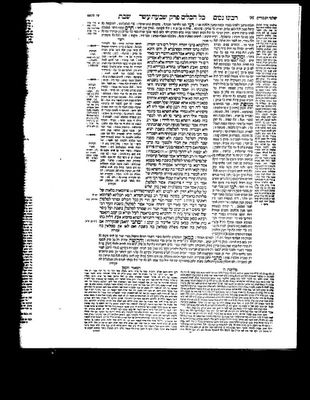
HIDE/SHOW IMAGE
48b
{Shabbat 124b continues}
that the halacha is like Rabbi Yehuda for it is established for us that {in a dispute between} Rabbi Meir and Rabbi Yehuda, the halacha is like Rabbi Yehuda.
And to us {=the Rif} it is logical that these words are only when they argue explicitly {that is, Rabbi Meir is mentioned by name}, but when Rabbi Meir is stam {anonymous} and Rabbi Yehuda is the one who argues on him explicitly {by name}, we do not say that {in a dispute between} Rabbi Meir and Rabbi Yehuda, the halacha is like Rabbi Yehuda, but rather, the halacha is like the stam.
And even though they argue explicitly {with Rabbi Meir and Rabbi Yehuda mentioned explicitly} in a brayta, since the Tanna {who wrote this Mishna} made for us the anonymous opinion that of Rabbi Meir, the halacha is like Rabbi Meir, and we do not convern ourselves with the dispute in the brayta.
Rav Nachman said: The bricks that are left over from a building may be handled, since they are fit to sit on. [But] if he places them in rows, then he has certainly set them apart {for another building}.
Rava said: A small shard may be moved about, even in a public domain. Now, Rava is consistent with his view. For Rava was walking in the manor of Machoza, when his shoes become soiled with clay; [so] his attendant came, took a shard, and wiped it off. The Sages lifted their voice against him. He said to them: It is not enough that they have not learnt — they would even teach! If it were in a courtyard, would it not be fit for covering a utensil? Here too I have a use for it.
Rav Yehuda cited Shmuel: The bung of a barrel which is broken in pieces may be handled on Shabbat.
A brayta also said so: If a bung is broken in pieces [both] it and the fragments thereof may be handled on Shabbat. But one must not trim {יספות} a fragment thereof to cover a vessel or support the legs of a bed therewith; but if one throws it away on the dung heap while it is yet day {of Friday - this insertion "while it is yet day" is according to Rav Papa}, it is forbidden.
The explanation of יספות is to cut, as we learn in the Mishna {Maasarot 3:9}: וסופת באבטיח
{Shabbat 125a}
Rav {our gemara: Bar} Hamduri cited Shmuel: Shreds of reeds detached from a mat {קרומיות של מחצלת} may be handled on Shabbat.
What is the reason?
Rava said: Bar Hamduri explained it to me: What is the [reed-] mat itself fit for? For covering the earth. These too are fit for covering dirt.
To explain, קרומיות של מחצלת are the shreds of mats that have worn out.
Rabbi Zers cited Rav: Pieces of silk of aprons {שירי פרוזמיות} may not be handled on Shabbat.
Abaye said: This refers to rags less than three [fingerbreadths] square, which are of no use to rich or poor.
To explain, שירי פרוזמיות are worn out pieces of cloth, as we say in the first perek of Succah {Succah 11a}: Rav Amram Chasida made fringes {actually techeilet} on the garments of the members of his household {רמא תכלתא לפרזומא דאינשי ביתיה}...
The Sages learnt {in a brayta}: The fragments of an old oven are like all utensils which may be handled in a courtyard: this is Rabbi Meir's view. Rabbi Yehuda says: They may not be handled. Rabbi Yossi testified in the name of Rabbi Eleazar ben Yaakov concerning the fragments of an old oven that they may be handled on Shabbat, and concerning its lid [of the oven] that it does not require a handle {in order that it shall be permissible to handle it on Shabbat}.
And the halacha is like Rabbi Meir, as we have said earlier {on the top of this page}, and like Rabbi Eleazar ben Yaakov, since Ravina said: In accordance with whom do we handle nowadays the oven lids of the town Mechasia which have no handle? In accordance with whom? Rabbi Eleazar ben Yaakov.
MISHNA:
IF A STONE [IS PLACED] IN A PUMPKIN SHELL {used for drawing water}, AND ONE CAN DRAW [WATER] IN IT AND IT [THE STONE] DOES NOT FALL OUT, ONE MAY DRAW [WATER] IN IT; IF NOT, ONE MAY NOT DRAW WATER IN IT
It's been a while...
-
I've been blogging a bit on Substack, at Scribal Error. While focused more
on gemara and girsaot, I just had a post on Rationalism and Midrash. Check
ou...
3 years ago



No comments:
Post a Comment